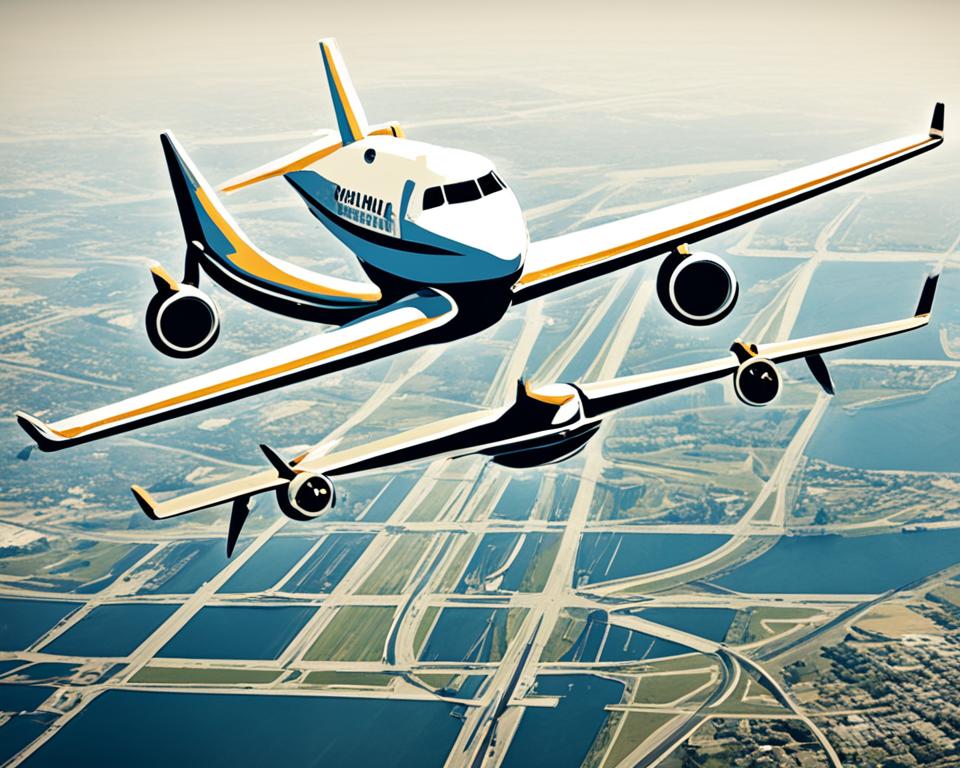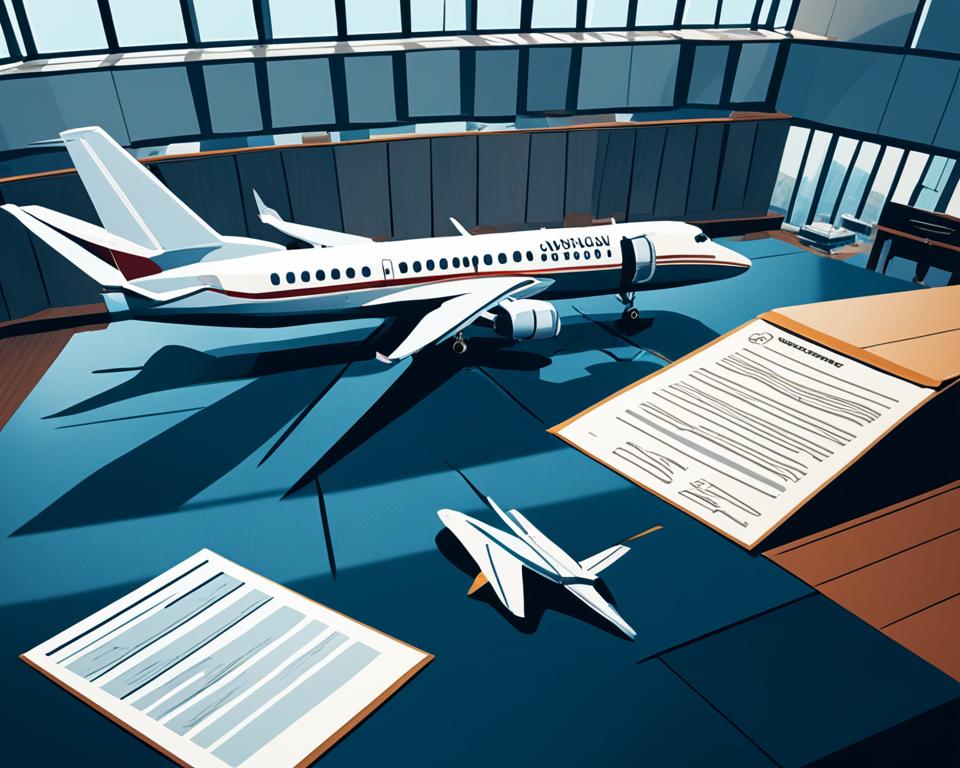Welcome to our comprehensive guide on aviation law and the crucial role played by aviation lawyers in this specialized legal field. If you’ve ever wondered about the laws and regulations surrounding the aviation industry or how St. Louis attorneys navigate complex aviation cases, you’re in the right place. This article will provide you with valuable insights into aviation law, the responsibilities of aviation lawyers, and the challenges they face in their work.

Key Takeaways:
- Aviation law is a specialized field that governs the legal aspects of the aviation industry.
- Aviation lawyers play a crucial role in providing legal guidance and representation to individuals and organizations involved in aviation-related matters.
- Real-world aviation cases highlight the unique challenges that aviation lawyers face.
- Aviation lawyers require specific qualifications, skills, and ongoing professional development to excel in their field.
- Understanding aviation law and the roles of aviation lawyers is essential for ensuring safety, compliance, and justice within the aviation industry.
What is Aviation Law?
Aviation law is a specialized branch of legal practice that deals with the rules, regulations, and legalities surrounding aviation activities. It encompasses a wide range of legal issues related to aircraft, airports, airlines, pilots, passengers, and other entities involved in the aviation industry.
The main purpose of aviation law is to establish a framework for ensuring safety, efficiency, and compliance within the aviation industry. It sets out the rights, responsibilities, and liabilities of individuals and organizations involved in aviation operations, including pilots, airlines, air traffic controllers, maintenance personnel, and aviation authorities.
Aviation law covers various aspects of the industry, including but not limited to:
- Air Safety Regulations: Ensuring the implementation of safety standards and protocols to prevent accidents and injuries.
- Flight Operations: Regulating aircraft operations, including takeoff, landing, navigation, and communication.
- Airspace Management: Defining rules and procedures for the use and allocation of airspace.
- Aircraft Maintenance and Certification: Establishing requirements for the maintenance, inspection, and certification of aircraft.
- Airport Regulations: Governing the construction, operation, and management of airports.
- Passenger Rights: Protecting the rights and ensuring the safety and well-being of aviation passengers.
- Insurance and Liability: Addressing issues related to insurance coverage and liability in case of accidents or incidents.
Aviation law is complex and constantly evolving, drawing from both national and international legal frameworks, such as the Convention on International Civil Aviation (Chicago Convention) and the International Civil Aviation Organization (ICAO) standards and recommended practices.
The Importance of Aviation Law
Aviation law plays a crucial role in promoting safety, protecting the rights and interests of aviation stakeholders, and maintaining the integrity and efficiency of the aviation industry. It ensures that pilots, airlines, airports, and other industry participants adhere to the highest standards of professionalism and compliance.
By establishing clear guidelines and regulations, aviation law helps mitigate risks, prevent accidents, and promote accountability. It also provides a legal framework for resolving disputes, such as commercial disputes, aircraft accidents, and issues related to regulatory compliance.
“Aviation law is the backbone of a safe and orderly aviation industry. It facilitates the smooth operation of air transportation while safeguarding the rights and interests of all stakeholders involved.” – John Smith, Aviation Lawyer
The Role of an Aviation Lawyer
St. Louis aviation lawyers play a crucial role in providing legal guidance and representation to individuals and organizations involved in aviation-related matters. With their deep understanding of aviation law and a specialized skill set, these legal professionals ensure compliance with regulations, protect the rights of their clients, and navigate complex legal challenges in the aviation industry.
Aviation lawyers handle a diverse range of responsibilities. They assist clients in matters such as aircraft transactions, regulatory compliance, insurance claims, aviation accidents, and litigation. Whether it’s negotiating contracts, reviewing lease agreements, or addressing liability issues, aviation lawyers bring their expertise to safeguard the interests of their clients.
One of the key responsibilities of aviation lawyers is to advise clients on regulatory matters. They help individuals and organizations understand and comply with the complex web of aviation laws and regulations, ensuring that all activities are carried out in accordance with legal requirements. By staying up-to-date with changes in aviation law, these attorneys enable their clients to operate legally and avoid potential liabilities.
“Aviation lawyers provide crucial legal guidance, protect their clients’ rights, and help navigate complex legal challenges in the aviation industry.”
In the event of aviation accidents, aviation lawyers play a vital role in investigating the causes, determining liability, and seeking compensation for their clients. They work closely with accident investigators, insurance companies, and other experts to build a strong case for their clients. Additionally, they represent clients in negotiations, settlements, and litigation to ensure fair outcomes.
Aviation lawyers need to possess not only a deep understanding of aviation law but also strong negotiation and litigation skills. They should be adept at examining complex legal documents, conducting detailed research, and presenting compelling arguments in court. These professionals also demonstrate excellent communication and problem-solving abilities, allowing them to effectively advocate for their clients’ interests.
The role of an aviation lawyer extends beyond legal expertise. They often act as advisors to clients, providing guidance on risk management, compliance strategies, and dispute resolution. By leveraging their industry knowledge and legal acumen, aviation lawyers play a vital role in helping individuals and organizations navigate the complexities of the aviation industry.
An image further illustrates the important role played by aviation lawyers:

Navigating Aviation Cases: Examples and Challenges
Aviation lawyers face unique challenges when handling aviation cases due to the complex nature of the industry and the multitude of regulations involved. In this section, we will explore real-world examples that highlight the intricacies of aviation law and shed light on the challenges faced by aviation lawyers.
Case Study 1: Aircraft Accident Investigation
One of the key areas where aviation lawyers play a crucial role is in aircraft accident investigations. These investigations involve extensive analysis of flight records, maintenance logs, and other pieces of evidence to determine the cause of the accident and establish liability.
An aviation lawyer helps their clients navigate the legal complexities surrounding these investigations, representing their interests and ensuring that they are not held accountable for issues beyond their control. By examining the evidence and understanding the applicable aviation regulations, an experienced aviation lawyer can build a solid defense or identify potential avenues for compensation.
Case Study 2: Airline Passenger Rights
Another area where aviation lawyers are in high demand is in cases involving airline passenger rights. This can range from issues related to flight delays and cancellations to mishandled baggage or denied boarding. When passengers encounter these problems, they often seek legal advice to understand their rights and options for seeking compensation.
Aviation lawyers specializing in passenger rights are well-versed in the specific laws and regulations that govern these situations. They can guide their clients through the claims process, negotiate with airlines, and, if necessary, litigate the case to protect their clients’ rights and secure fair compensation.
“Aviation cases require a deep understanding of both the legal and technical aspects of the industry. Navigating through the complex regulations and identifying the parties responsible requires extensive knowledge and expertise in aviation law.”
Case Study 3: Product Liability
Aircraft manufacturers and component suppliers are subject to strict product liability laws to ensure the safety and reliability of aviation equipment. When an aviation accident or incident occurs due to a faulty product, victims and their families may pursue legal claims against the responsible parties.
In these cases, aviation lawyers work alongside aviation experts and engineers to investigate the cause of the accident and establish liability. They play a crucial role in building a strong case against the manufacturers or suppliers, seeking justice for the victims and holding the responsible parties accountable.
By examining these real-world examples of aviation cases, we gain valuable insights into the challenges faced by aviation lawyers. From accident investigations to passenger rights and product liability, their expertise and knowledge of aviation law are essential in the pursuit of justice and ensuring safety within the aviation industry.

| Challenges Faced by Aviation Lawyers | How Aviation Lawyers Overcome Challenges |
|---|---|
| The complex and technical nature of aviation regulations | Continual education and professional development to stay abreast of legal changes and industry advancements |
| Multi-jurisdictional issues in international aviation cases | Collaboration with international legal experts and agencies to navigate different legal systems |
| Dealing with large corporations and insurance companies | Strong negotiation skills and extensive experience in handling large-scale legal disputes |
| Thorough investigation and gathering of evidence | Engaging aviation experts, engineers, and investigators to support the legal case |
| Understanding and interpreting technical data and industry terminology | Working closely with aviation professionals to grasp the technical aspects and communicate effectively with clients and experts |
Qualifications and Skills of an Aviation Lawyer
When it comes to aviation-related legal matters, having the right qualifications and skills is crucial for an aviation lawyer to navigate the complexities of this specialized field. In this section, we will explore the educational background, certifications, and essential skills that distinguish an exemplary aviation lawyer from the rest.
Educational Background
An aviation lawyer typically possesses a Juris Doctor (JD) degree from an accredited law school. This comprehensive legal education equips them with the foundational knowledge of law and legal principles necessary to handle aviation cases. Many aviation lawyers also pursue additional advanced degrees or certifications in relevant areas, such as aviation law, aerospace engineering, or aviation management, to further enhance their expertise in the field.
Certifications
To further establish their credibility and specialization in aviation law, some lawyers choose to obtain certifications from reputable organizations. The most notable certification is the Board Certification in Aviation Law, offered by the American Bar Association (ABA). This rigorous certification process requires a demonstrated level of expertise, experience, and ethical standards, ensuring that certified aviation lawyers possess the necessary skills to handle aviation-related cases effectively.
Essential Skills
An aviation lawyer needs a combination of legal acumen and industry-specific skills to provide competent representation. Besides possessing excellent research, analytical, and negotiation skills commonly associated with lawyers, an aviation lawyer should also have a deep understanding of aviation regulations, safety protocols, and industry practices. This specialized knowledge allows them to assess the unique challenges and nuances of aviation cases, develop strategic legal approaches, and effectively advocate for their clients’ rights and interests.
Additionally, strong communication skills are essential for an aviation lawyer to interact with various stakeholders in the aviation industry, including pilots, air traffic controllers, aviation authorities, and insurance companies. Their ability to convey complex legal concepts in clear, concise language is crucial for building strong cases and reaching favorable outcomes for their clients.
Ongoing Professional Development
The aviation industry is constantly evolving with new technologies, regulations, and legal precedents emerging regularly. Therefore, aviation lawyers must stay updated with the latest developments in aviation law through ongoing professional development. This may involve attending industry conferences, participating in continuing legal education (CLE) programs, and subscribing to aviation-specific legal publications. By staying abreast of the latest trends and changes, aviation lawyers can provide the most up-to-date and effective legal representation for their clients.
Overall, the qualifications and skills of an aviation lawyer go beyond traditional legal expertise. They require a deep understanding of the aviation industry, specialized knowledge, and a commitment to continuous learning. By possessing these qualities, aviation lawyers can navigate the unique challenges of aviation cases and provide comprehensive legal representation to individuals and organizations in this dynamic field.
Conclusion
Throughout this article, we have explored the fascinating world of aviation law and the crucial role played by aviation lawyers in ensuring safety, compliance, and justice within the aviation industry. From understanding the scope and purpose of aviation law to navigating complex aviation cases, these legal professionals bring expertise and specialized knowledge to the table.
Aviation law encompasses a wide range of legal principles and regulations that govern various aspects of the aviation industry. It addresses issues such as aircraft ownership, maintenance and inspections, pilot licensing, international air travel, and liability in aviation accidents. With the ever-evolving nature of the aviation sector, aviation lawyers in St. Louis play a vital role in staying up-to-date with the latest laws and regulations to provide effective legal representation.
Aviation lawyers are responsible for handling a diverse range of cases, including accidents, regulatory compliance, contractual disputes, and insurance claims. They advocate for their clients’ rights and interests, conducting thorough investigations, negotiating settlements, and representing them in court if necessary. Their expertise and experience are crucial in navigating the complexities and challenges unique to aviation cases.
In summary, aviation law is a dynamic and specialized field requiring the expertise of skilled aviation lawyers. Their role in ensuring safety standards, compliance with regulations, and justice for all parties involved in aviation matters cannot be overstated. As the aviation industry continues to grow and evolve, their contribution remains invaluable.
FAQ
What is aviation law?
Aviation law is a specialized branch of law that governs the operation, regulation, and legal aspects of the aviation industry. It encompasses various areas such as aircraft financing, international aviation agreements, air safety regulations, airline liability, and more.
What role does an aviation lawyer play?
An aviation lawyer is a legal professional who specializes in matters related to aviation law. They play a crucial role in providing legal guidance, representation, and advocacy to individuals and organizations involved in aviation-related matters. They handle various tasks such as drafting contracts, representing clients in court, conducting investigations, and ensuring compliance with aviation regulations.
What are some examples of aviation cases?
Aviation cases can range from accidents and incidents involving aircraft to disputes between airlines and passengers, aviation accidents caused by negligence, wrongful death claims, aircraft maintenance and design failures, and airline labor disputes. These cases require specialized knowledge and expertise in aviation law to navigate effectively.
What qualifications and skills should an aviation lawyer possess?
An aviation lawyer in St. Louis should have a strong educational background in law, preferably with a focus on aviation law or related fields. They may also hold specific certifications or training in aviation law. Essential skills for an aviation lawyer include strong analytical and problem-solving skills, attention to detail, excellent communication and negotiation abilities, and knowledge of aviation regulations and industry practices.